by Mark Hudson | Jul 31, 2019 | Chimney Liner
The chimney liner is vitally important to the proper operation of a chimney system. Like human skin, the liner is one of the largest parts of the whole system and operates as a barrier that keeps the system working safely and properly. The liner keeps the heat of the fire in its place and prevents the gases and heat from traveling through the masonry and affecting the rest of the home as it rises out of the chimney. When there is damage to the liner, it can put your family and home at risk. The problem is, this type of damage is hidden from sight and may not be recognized right away. When liner damage is reported by a professional, it’s important to schedule a repair right away. When your chimney expert is Hudson Chimney of Jacksonville, Florida, you can count on a repair using HeatShield chimney products.
HeatShield Cerfractory Flue Sealant
No matter how serious your liner damage, we can fix it using HeatShield Cerfractry Flue Sealant. This cerfractory technology combines the strength of ceramic with the heat resistance of refractory  material, allowing your chimney professional to repair and restore your liner with an easy application of a specially-formulated hybrid product.
material, allowing your chimney professional to repair and restore your liner with an easy application of a specially-formulated hybrid product.
- The Test of Time – HeatShield was developed over 20 years ago and has withstood the test of time in the industry as well as actual factory-testing before the products hit the market. In fact, HeatShield has been tested against temperatures over 2900 °F. When you choose HeatShield you get a product that is safe for all fuel types, long lasting like a stainless liner, and one that restores the integrity of your chimney’s flue completely.
- Independent Certified Installers – HeatShield installers are certified and experienced using this product for your liner repairs and restorations. When you hire a professional HeatShield installer, he or she will be factory trained and will use specially designed tools to expertly repair your liner using the only cerfractory sealant on the market.
- Economical and Eco-Friendly – Made of recycled and naturally occurring materials, HeatShield is a cheaper alternative to replacing your entire liner. With this product, you can have the specific damage repaired only without damaging the rest of the liner.
- Limited Lifetime Warranty – No matter what your chimney needs, if we use HeatShield to repair or restore it, the product is covered by a limited lifetime warranty.
Joint Repair and Resurfacing with HeatShield
One of the most damaging things that can happen to your liner is that the joints can become riddled with gaps and cracks. When this happens you may find pieces of mortar or clay tile pieces in the fireplace. No matter how extensive the damage, we can restore the joints with HeatShield by placing the product in a custom applicator placed beneath each affected area. As we pull the custom foam blade upward, the product fills cracks and gaps. If the damage is extensive, this process can be used to resurface the entire flue from the bottom to the top, restoring the liner completely.
Using HeatShield products we can clean the flue, repair, resurface, and even reline the flue. Not sure what type of repair your liner needs this summer? Let us take a look. Call Hudson Chimney at 904-282-4159 and we’ll get your flue fixed before fall.
by Mark Hudson | Jul 10, 2019 | Chimney Leaks
Most of the U.S. is getting more rain for this time of year than ever before. In much of the Midwest, farmers aren’t able to seed their cropland, and still, the rain just keeps on coming. In Florida, we are four weeks into Hurricane Season, and there are already five hurricanes projected to hit us this season.
The rain and wind that come with these storms mean we need to protect our chimneys from water damage. It also means you should schedule preventative services with a chimney professional or schedule repairs for damages that have already occurred. At Hudson Chimney, we are the professionals with the knowledge and experience to take care of all your leaky chimney needs!
The Problem with Chimney Leaks
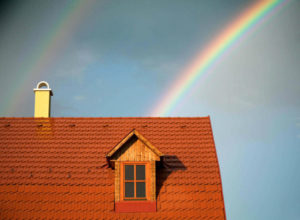 Water is the worst thing that can happen to a masonry chimney. The reason water can cause so much damage is because of the materials which make up the masonry. The masonry is porous in nature, and it is made of various materials that are highly affected by moisture. A chimney system may be well made, but even a small amount of water can destroy it from the inside out.
Water is the worst thing that can happen to a masonry chimney. The reason water can cause so much damage is because of the materials which make up the masonry. The masonry is porous in nature, and it is made of various materials that are highly affected by moisture. A chimney system may be well made, but even a small amount of water can destroy it from the inside out.
When water is allowed into the chimney system, either by the top (at the cap or crown) or through the sides (flashing and masonry), you can guess there is likely damage. Since most of the chimney system is not readily visible, the leak may take time to notice and damage might occur before anything can be done about it. The best way to prevent water damage is to prevent chimney leaks, and our team is here to help.
Signs of a Chimney Leak
Leaks often go unnoticed because much of the leak occurs behind the scenes, and homeowners aren’t sure what to look. In order to catch a leak early, it’s important to know what to look for, and here are some of the signs of a leaky chimney.
- Stains on masonry interior and exterior
- Dripping sounds and visible water in the chimney
- Odors of mildew and mold
- A high amount of moisture in the home
- Cracks and deterioration in masonry
- Leaks in other parts of the home
When you experience a leak, it can be nerve-racking. When you call in the right professional to deal with it, it won’t be a big deal. Many homeowners tend to call a general contractor for leaks, assuming it’s a roof or plumbing problem. The best option for homeowners with chimneys, however, is to call the chimney professionals. We will not only assess the leak, but we will also correct it at the source. We install new caps and flashing, repair crowns and masonry, and we also waterproof chimneys for good measure. Our waterproofing services will protect the masonry from water intrusion for ten years!
Are you a homeowner in Northeast Florida, and you aren’t sure if your chimney system is properly protected against water leaks? Call Hudson Chimney today at 904-282-4159. Our team will take care of your chimney!
by Mark Hudson | May 5, 2016 | Chimney Inspections
Exterior damage to your masonry chimney is easily noticed, but problems deep within the flue can be impossible for you to see. A lot of damage can be lurking inside your chimney, and you could be endangering yourself and your family by using your fireplace when any damage exists. This is why it is so important to have an annual professional chimney inspection. At Hudson Chimney, we have all been certified by the Chimney Safety Institute of America (CSIA) in properly inspecting chimneys. We know where to look for damage inside your flue, and we perform video scans on certain inspections we do, which allows us to see every inch of the interior of your chimney. If we do find any problems, we have the video footage that we can show you to help you understand the type of repairs needed to correct the issue. We would like to tell you a bit more about the importance of chimney inspections.
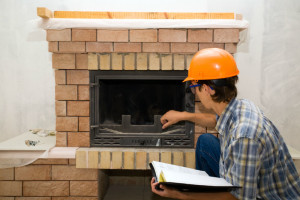
What kind of damage can typically be found inside a chimney?
One of the most common problems Hudson Chimney often finds inside chimneys is a cracked chimney liner, which can be very hazardous. If your chimney has suffered a water leak, your liner can suffer from rusting and other corrosion damage and crack and break apart. When your liner has cracks and gaps, the toxic byproducts of combustion can leak into your home. Another issue we see is chimney blockages. Many things can block your flue, including leaves, sticks, nesting materials from birds and wild animals, soot, and creosote. When your chimney is blocked, you are at a higher risk of a chimney fire and a carbon monoxide leak. Something else we often find when we inspect the interior of chimneys is a flue that is not properly sized to the heating appliance. This can cause problems including an overproduction of carbon monoxide, chimney draft issues, and inefficiencies in the operation of your fireplace and chimney.
What is involved in a chimney inspection from Hudson Chimney?
Your chimney inspection will depend on the level you need. Over a decade ago, the National Fire Protection Association (NFPA) adopted three levels of chimney inspections to remove inconsistencies in inspections and streamline the process across the country. Level 1 is the most basic level of inspection, which is included with our annual chimney sweeping services. For this level, we will carefully check out the readily accessible parts of the inside and outside of your chimney and the accessible parts of your heating appliance and its heating connection. If you have changed your heating appliance, are selling or buying a home, or have experienced a chimney fire, earthquake, or severe weather event, you will need a Level 2 inspection. This level includes everything in a Level 1 inspection, a video scan, and an examination of the attic, crawl space, or basement. If we find a potentially hazardous problem, we will recommend you have a Level 3 inspection. This level includes everything in a Level 2 inspection and the removal of components, such as the chimney crown and an interior chimney wall. While a Level 3 inspection may seem destructive, it is necessary for your safety.
Just because your chimney looks great on the outside, you could have hidden hazards lurking inside your flue. Contact us at Hudson Chimney to schedule your annual chimney inspection today.
by Mark Hudson | Oct 31, 2015 | Chimney Ivy
Although the look of ivy climbing up your masonry chimney can be a beautiful sight, this climbing vine can actually damage its structure. Especially if your home was built before 1930, ivy may cause deterioration of the bricks and mortar of your chimney. Masons did not use mortar mixed with Portland cement to construct homes until after 1930, and the earlier mortar mixes are not nearly as strong and durable, according to Today’s Homeowner. Climbing vines like ivy can easily grow into any existing cracks in the bricks and mortar, and this growth can quickly worsen that damage. Our staff at Hudson Chimney knows that many people love the appearance of climbing vines growing against their chimneys, but we would like to tell you more about why ivy and other similar plants can damage your chimney.
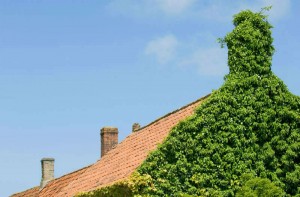
What kind of damage can ivy and other climbing vines do to my chimney?
Certain types of ivy such as English ivy grow very aggressively and will attach themselves into cracks and other eroded areas in the masonry materials of your chimney. Additionally, it can be challenging to even see spalling and erosion damage of the bricks and mortar when your chimney is covered by ivy. One of the biggest problems with ivy growing into your masonry chimney is that if you attempt to pull away any ivy growth to check for cracked or missing bricks, you risk the possibility of pulling down your entire chimney structure.
What can I do if I want to keep the ivy growing on my chimney?
Hudson Chimney can professionally inspect the condition of the masonry materials of your chimney to see if it can support the growth of climbing vines without suffering from further damage. Well-built masonry chimneys typically do not have problems with damage from ivy and other climbing vines. Our expert chimney technicians will know if your chimney was built with mortar containing Portland cement, and we will make any necessary repair recommendations that should be done that will allow you to keep your ivy growing against your chimney.
Does Hudson Chimney have any recommendations of better climbing vines to plant?
We do suggest that you avoid any aggressive vines such as English ivy. Virginia creeper and Boston ivy are great alternatives to consider planting. You can also keep these vines from growing directly against the chimney by installing a support made of wire, lattice, or trellis around your chimney. Non-attaching climbing vines such as roses, wisteria, clematis, and jasmine can easily grow along this type of support without any possible damage done to your chimney. Even better, you can move the support to make chimney inspections and repairs easier.
If your older chimney is covered with ivy, contact us at Hudson Chimney. We can inspect the condition of your chimney to be sure no damage has been done.
by Mark Hudson | May 28, 2015 | Jacksonville
In 1979, Mark Hudson founded Hudson Chimney to provide professional fireplace and chimney services in Northeastern Florida. Certified by the Chimney Safety Institute of America (CSIA) as a chimney sweep and a dryer vent technician, Hudson is proud to serve the city of Jacksonville and works hard on community projects to make Jacksonville an even better place. We would like to tell you more about this beautiful city we have served for over 30 years.
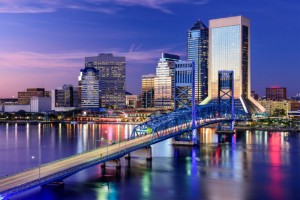
WATER ACTIVITIES
With over 22 miles of beaches, Jacksonville is home to three beaches: Atlantic Beach, Jacksonville Beach, and Neptune Beach. Our beach areas offer dining, entertainment, lodging, and recreational activities for the entire family. Fishermen have the best of both worlds in Jacksonville with freshwater and saltwater fishing opportunities. You can even deep sea fish in the Atlantic Ocean. The St. Johns River flows through the city and provides a place to kayak and paddleboard.
ARTS AND CULTURE
Named as one of the top 25 destinations for the arts in this country, Jacksonville is home to several museum, including the Museum of Contemporary Art Jacksonville (MOCA). At MOCA, you will find over one thousand works of art, such as painting, photography, sculpture, and printmaking. You can also find live theater and live music throughout the city as well as festivals throughout the year that celebrate jazz, blues, and country music.
SPORTS
Sports fans have a lot to enjoy in Jacksonville. You can watch professional football by going to see a Jacksonville Jaguars game, and you can catch one of the biggest professional golf tournaments, THE PLAYERS Championship. Golfers can even play a round at the site of this tournament. Outdoor sports enthusiasts can enjoy biking, hiking, canoeing, surfing, and other activities along our scenic waterways.
HISTORY
Filled with multiculturalism, the history of Jacksonville can be found throughout the city. One of the city’s most important historical sites is Fort Mose, which was both the earliest legal settlements in America for free Africans and the precursor site to the Underground Railroad. For a deeper look at the history of Jacksonville, tour one of our historical museums, such as the Mandarin Museum & Historical Society that shows what life was like in 19th century Florida.
SHOPPING
Whether you prefer shopping at a mall, at locally-owned boutiques, along the beachside, or in a downtown setting, Jacksonville is filled with opportunities to shop until you drop. If you like to save money, you will enjoy shopping at our two outlet shopping centers. No matter your budget, shopping enthusiasts will love what our city has to offer.
Want to know more about Jacksonville? Contact Hudson Chimney to find out our favorite places and things to do in this beautiful city.
 material, allowing your chimney professional to repair and restore your liner with an easy application of a specially-formulated hybrid product.
material, allowing your chimney professional to repair and restore your liner with an easy application of a specially-formulated hybrid product.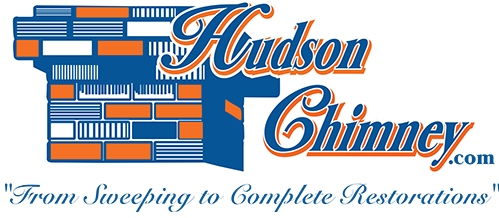
 Water is the worst thing that can happen to a masonry chimney. The reason
Water is the worst thing that can happen to a masonry chimney. The reason 

